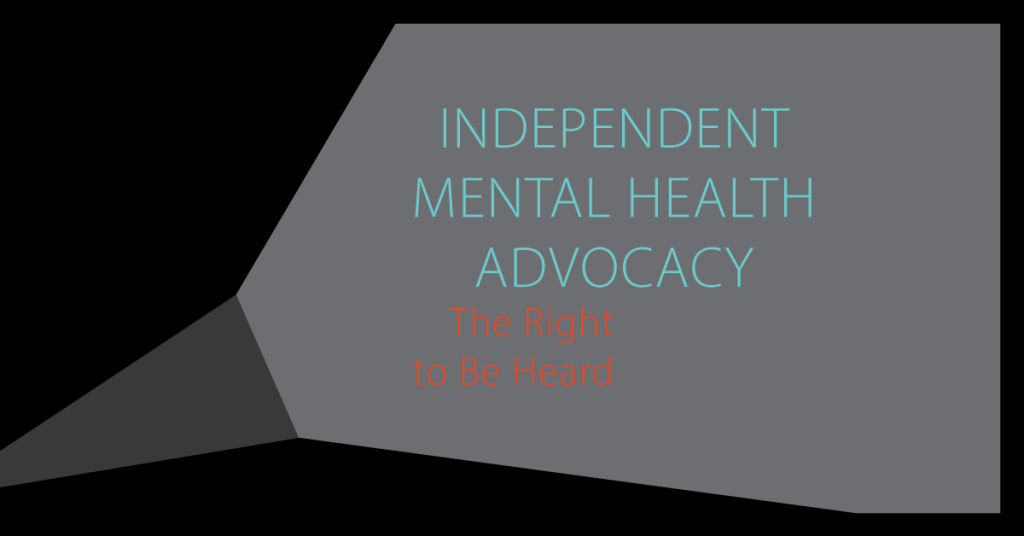Independent Mental Health Advocacy is all about giving a voice to those whose rights have been compromised. Hot on the heels on the release of their new book Independent Mental Health Advocacy – The Right to be Heard, co-authors Karen Newbigging, June Sadd, and Karen Machin explain the role that IMHAs play within mental health services, and the principles and practice of the role.
The Mental Health Act allows for people to be detained in hospital and, in specific circumstances, treated against their will. Changes made in 2007 extended these powers into the community with Community Treatment Orders, with the safeguard of a new statutory role of Independent Mental Health Advocacy (IMHA).
In researching IMHA across England, we heard about its value and how it had helped people get off a section quicker, or negotiate a change in medication or leave. For some people, it enabled them to feel valued and built their self-confidence so that they could advocate for themselves. For a small number of people, however, it seemed like IMHA services were maintaining the status quo, giving the appearance of protecting individuals’ rights without really changing their situation.
As a team, and perhaps particularly because some of us have experience of being sectioned, we were troubled by this finding. How could an apparently progressive step for human rights be misused or misinterpreted in this way? This led us to reflect on the grassroots nature of advocacy and how its introduction as a statutory duty could have fundamentally, but not necessarily, altered its nature.
Advocacy has a long and honourable tradition in mental health, where the experience of being detained is profoundly disempowering. Limited choices or inadequate support and treatment from mental health services have raised questions about upholding people’s rights and the availability and quality of care. Incidents that have involved people at specific risk of discrimination have brought this into sharp focus, including the higher rates of detention of African and African-Caribbean people under the Mental Health Act, the poor treatment of people with learning disabilities and, in extreme circumstances, deaths of detained patients following restraint.
The purpose of IMHAs is to provide a safeguard for people detained under the Mental Health Act and to enable individuals to have a greater say in decisions about their care and treatment. In this book, we explore this type of advocacy drawing on available research, including our own. We take a critical look at IMHA services, considering their foundational roots and the factors that shape how these are provided and that will have a direct bearing on their impact.
The development of IMHA services has to be understood and evaluated in context and the first part of the book is devoted to this. We start by exploring the disputed terrain of mental health and different perspectives on what this means, the origins of advocacy in the survivor movement and the emergence of IMHA services, borne out of the lengthy and contested process of the reform of the1983 Mental Health Act.
Our individual values, experiences and reading of the research on experiences of compulsion raised questions for us about the fundamental purpose of mental health legislation and its value, pointing to much-needed reform. Although this research reinforces IMHA as an essential safeguard for protecting rights, the interpretation of the legal framework often privileges negative rights (such as refusing treatment), thus overshadowing more substantive rights (the rights to health and civil and social participation). The second part of the book keeps the latter focus in mind, as we discuss how IMHA services should be commissioned and provided, and the skills that IMHAs need to enable an individual to self-advocate, and mental health services to listen.
Access to IMHA services is still problematic and people who might need this form of advocacy the most are often the least likely to have access. We consider how well IMHA services are being commissioned and provided so that they are available and suitable for everyone, such that they take account of prior experiences of discrimination and how these can be reproduced through the mental health system, reinforced by legislation and in advocacy provision.
The relationship between advocates and mental health professionals should be unsettling and can be fraught for various reasons, including a lack of appreciation of the advocacy role and a professional assumption that they are best placed to be the person’s advocate. Nonetheless, this can also work well, and we identify a framework for understanding such tensions and possibilities for constructive working relations.
It for these reasons that we conclude by looking at the future of advocacy, as a glass half-full/half-empty scenario. This deliberately evokes the paradox described by Peter Campbell (2009:51) that although the right to advocacy is ‘partly recognized, service user influence over its provision is diminishing’. Readers will decide for themselves whether this is a glass half full or half empty!
We have found that the process of coming together and co-writing this book has been a really rich one. We brought different perspectives and experiences to the task and hope that this has resulted in a penetrating analysis of IMHA that both highlight the complexities and suggest some ways in which these can be thought about and addressed. We hope that our book will contribute to shaping future development so that, ultimately, people detained under the Mental Health Act really do have a say, and that their rights, beyond the narrow confines of the Act, are promoted.
Karen Newbigging is a Senior Lecturer at the Health Services Management Centre, University of Birmingham and is active in advocacy research and development. June Sadd, an independent survivor consultant, educator and researcher, draws on her personal experience of the psychiatric system in her work. Karen Machin works freelance in mental health from a perspective of lived experience. Learn more about Independent Mental Health Advocacy – The Right to Be Heard.
